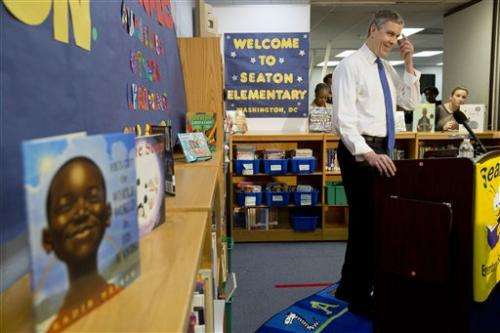Education secretary says he backs annual testing

Foreshadowing what could be a contentious battle with Congress, Education Secretary Arne Duncan said Monday that rolling back federal testing requirements in math and reading would deprive students, parents and their schools of critical information needed to measure educational progress.
Duncan chose the 50th anniversary of President Lyndon Johnson's introduction of a landmark education equity bill to make the Obama administration's case for continued testing. Civil rights groups and state education chiefs also have voiced support for it.
"I believe parents, and teachers and students have both the right and the absolute need to know how much progress all students are making each year towards college and career readiness," Duncan said.
He said that too many 16- and 17-year-olds find out too late they aren't prepared for college, and "those days must be over."
The No Child Left Behind education law, signed into law by President George W. Bush in 2002, requires children to be tested in reading in math in grades three through eight and once in high school.
With Republicans newly in charge of both houses of Congress, Senate education Chairman Lamar Alexander, R-Tenn., has said his top priority is fixing the law, which expired in 2007. His first hearing is expected next week with a focus on testing. Both he and House education Chairman John Kline, R-Minn., have said the federal government needs to get out of the business of deciding what to do about low-performing schools, education standards and teacher evaluations.
Alexander said in a statement that the committee expects to send a bill to the Senate early this year. "My goal is to keep the best portions of the original law and restore to states and communities the responsibility for deciding whether teachers and schools are succeeding or failing," he said.
Duncan acknowledged that there are places where tests—and test preparation—take up an excessive amount of time. He urged Congress to provide money to states to improve the quality of their tests and to have states set limits on time spent on standardized testing.

As he laid out a case for equity in education, Duncan said he's "deeply concerned about where some Republicans are headed."
No Child Left Behind requires schools to show annual growth in student achievement or face consequences. It has been credited with putting a focus on how schools handle minority, low-income, English learners and special needs students, but also has led to complaints that teachers were teaching to standardized tests and that mandates were unrealistic and penalties ineffective. Beyond the federal requirements, many districts and states require other standardized tests.
Since 2012, President Barack Obama has allowed states to get a waiver from some of the more stringent requirements of the law, but they had to agree to requirements such as implementing teacher evaluation systems with teeth.
There's been widespread agreement that the comprehensive law needs to be fixed, but disagreement over how to do it.
The National Education Association, a teachers union, wants Congress to adopt a federal requirement that students be tested just once in elementary, middle and high school. "Parents and educators know that the one size fits all annual federal testing structure has not worked," NEA President Lily Eskelsen García said in a statement. She said states and districts should be given flexibility in deciding how to use testing to identify achievement gaps.
On Sunday, a coalition of 20 civil rights groups said a top priority with the reauthorization is continuing the federal annual testing mandate.
"The reason is simple: Kids who are not tested end up not counting," said Kati Haycock, president of the Education Trust.
The Council of Chief State School Officers said it supports annual testing because "every parent has a right to know how their child is performing academically in public school."
Testing also has been an issue because of the role it can play in teacher evaluations. Last year, Duncan said states can apply for extra time before they use student test scores to judge educators' performance.
Another factor is that millions of students this spring for the first time will take new Common Core-based assessments.
Several states and districts already are reviewing the quality and quantity of tests given.
Speaking at Seaton Elementary School in a historically African-American neighborhood, Duncan said that Obama's proposed budget will include $2.7 billion for enhanced programs under the Elementary and Secondary Education Act.
© 2015 The Associated Press. All rights reserved.


















